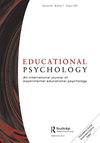Emergence of college students’ John Henryism during schoolwork: an exploratory study
IF 3
2区 心理学
Q1 EDUCATION & EDUCATIONAL RESEARCH
引用次数: 1
Abstract
Abstract John Henryism (JH), named after the American folk hero John Henry, is a construct characterised by a behavioural predisposition for high-effort coping with psychosocial stressors. While it has been rigorously studied in the health sciences, little empirical research has focused on how JH emerges within educational contexts, specifically during schoolwork. This exploratory study investigated factors related to JH—race/ethnicity, gender, first-generation college student status, and high-effort coping—on school-based cognitive and emotional engagement. Results revealed that high JH scores predicted positive cognitive and emotional momentary engagement, particularly for racial/ethnic minorities and first-generation college students. Furthermore, in comparing our subsample of first-generation females with our overall sample of female students, we learned that JH had a greater positive influence on first-generation females’ momentary engagement than on that of the overall sample of female students. Findings suggest that historically marginalised groups may regularly rely on JH to cope with systemic inequality in school activities.大学生作业中约翰·亨利主义的产生:一项探索性研究
摘要约翰·亨利主义(JH)以美国民间英雄约翰·亨利的名字命名,是一种以努力应对心理社会压力为特征的行为倾向。虽然在健康科学中对JH进行了严格的研究,但很少有实证研究关注JH是如何在教育环境中出现的,特别是在课业中。这项探索性研究调查了与JH相关的因素——种族/民族、性别、第一代大学生身份和高努力应对——对学校认知和情感参与的影响。结果显示,高JH分数可以预测积极的认知和情感瞬间参与,尤其是对于少数民族和第一代大学生。此外,在将我们的第一代女性子样本与我们的女学生总体样本进行比较时,我们了解到JH对第一代女性的瞬时参与的积极影响大于对女学生总体抽样的积极影响。研究结果表明,历史上被边缘化的群体可能经常依赖JH来应对学校活动中的系统性不平等。
本文章由计算机程序翻译,如有差异,请以英文原文为准。
求助全文
约1分钟内获得全文
求助全文
来源期刊

Educational Psychology
Multiple-
CiteScore
6.40
自引率
6.20%
发文量
57
期刊介绍:
This journal provides an international forum for the discussion and rapid dissemination of research findings in psychology relevant to education. The journal places particular emphasis on the publishing of papers reporting applied research based on experimental and behavioural studies. Reviews of relevant areas of literature also appear from time to time. The aim of the journal is to be a primary source for articles dealing with the psychological aspects of education ranging from pre-school to tertiary provision and the education of children with special needs. The prompt publication of high-quality articles is the journal"s first priority. All contributions are submitted "blind" to at least two independent referees before acceptance for publication.
 求助内容:
求助内容: 应助结果提醒方式:
应助结果提醒方式:


